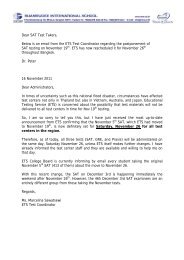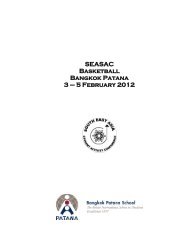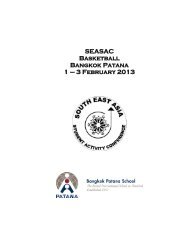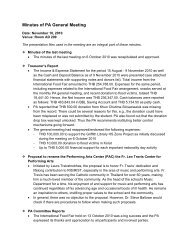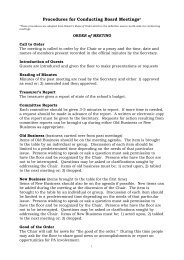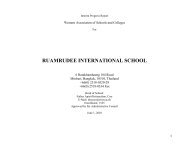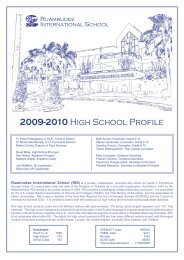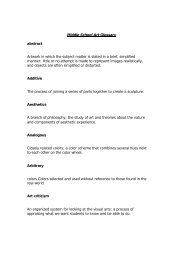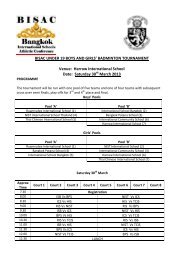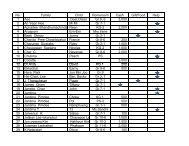Third Culture Kids: What Every International School T h N d t k ...
Third Culture Kids: What Every International School T h N d t k ...
Third Culture Kids: What Every International School T h N d t k ...
Create successful ePaper yourself
Turn your PDF publications into a flip-book with our unique Google optimized e-Paper software.
<strong>Third</strong> <strong>Culture</strong> <strong>Kids</strong>:<br />
<strong>What</strong> <strong>Every</strong> <strong>International</strong> <strong>School</strong><br />
Teacher Needs to know<br />
SAPPHIRA BEAUDIN<br />
HARROW INTERNATIONAL SCHOOL
<strong>What</strong> is a <strong>Third</strong> <strong>Culture</strong> Kid (TCK)?<br />
“A <strong>Third</strong> <strong>Culture</strong> Kid (TCK) is a person who has<br />
spent a significant part of his or her developmental<br />
years outside the parents’ culture. The TCK builds<br />
relationships to all of the cultures, while not having<br />
full ownership of any.”<br />
- “<strong>Third</strong> <strong>Culture</strong> <strong>Kids</strong>” by Pollock and Van Reken
Discussion<br />
• <strong>What</strong> are the types of TCKs in your school?<br />
• <strong>What</strong> do they look like?<br />
• <strong>What</strong> are the demographics / characteristics?
<strong>What</strong> are the different types of TCKs?<br />
• Why do children move?<br />
• Traditional TCKs<br />
• Today’s TCKs
<strong>What</strong> are the different types of TCKs?<br />
• Military brats, primarily from the United States, are the most<br />
mobile of TCKs but generally spend only a few years abroad, and<br />
sometimes none at all. Approximately 41% of military brats<br />
spend less than 5 years in foreign countries. They are the least<br />
likely TCKs to develop connections with the locals. Because<br />
military bases aim for self-sufficiency, military brats tend to be<br />
exposed the least to the local culture. Also, because of the self-<br />
sufficiency of military bases and the distinctiveness of military<br />
culture, even those military brats who never lived abroad can be<br />
isolated to some degree from the civilian culture of their "home"<br />
country.<br />
• While parents of military brats had the lowest level of education<br />
of the five categories, approximately 36% of USA military brat<br />
TCK families have at least one parent with an advanced degree.<br />
This is significantly higher than the general population.
<strong>What</strong> are the different types of TCKs?<br />
• Nonmilitary government TCKs are the most likely l to<br />
have extended experiences in foreign countries for<br />
extended periods. 44% have lived in at least four<br />
countries. 44% will also have spent at least 10 years<br />
outside of their passport country. Their involvement<br />
with locals and others from their passport country<br />
depends on the role of the parent. Some may grow<br />
up moving from country to country in the diplomatic<br />
corps while others may live their lives near military<br />
bases.
<strong>What</strong> are the different types of TCKs?<br />
• Missionary i <strong>Kids</strong> (MKs) typically spend the most time<br />
overseas in one country. 85% of MKs spend more<br />
than 10 years in foreign countries and 72% lived in<br />
only one foreign country. MKs generally have the<br />
most interaction with the local populace and the<br />
least interaction with people from their passport<br />
country. They are the most likely to integrate<br />
themselves into the local culture. 83% of missionary<br />
kids have at least one parent with an advanced<br />
degree.
<strong>What</strong> are the different types of TCKs?<br />
• Business families also spend a great deal of time in<br />
foreign countries. 63% of business TCK's have lived<br />
in foreign countries at least 10 years but are more<br />
likely than MKs to live in multiple countries.<br />
Business TCKs will have a fairly high interaction with<br />
their host nationals and with others from their<br />
passport country.
<strong>What</strong> are the different types of TCKs?<br />
• Mixed families (this is not yet included d in the TCK<br />
research) Each parent is from a different country and<br />
are either living in one parent’s country and<br />
switching to the other parent’s country or both<br />
parents are living in a different country to their own<br />
completely.
<strong>What</strong> are the different types of TCKs?<br />
• Local families (this is not yet included d in the TCK<br />
research) Parents who send their children to<br />
international schools. The children attend schools<br />
that are in their passport / parent countries but<br />
acquire a culture that is different to their passport /<br />
parent country (i.e. Westernised, <strong>International</strong>ised)
Ways that TCK’s can relate to their surrounding culture
Cross Cultural <strong>Kids</strong>
Cross Cultural <strong>Kids</strong> (CCKs)<br />
• Traditional TCKs –Children who move into another culture with parents due to a parent’s career<br />
choice<br />
• Bi/multi‐cultural/ and/or bi/multi‐racial children —Children born to parents from at least two<br />
cultures or races<br />
• Children of immigrants —Children whose parents have made a permanent move to a new<br />
country where they were not originally citizens<br />
• Children of refugees —Children whose parents are living outside their original country or place<br />
due to unchosen circumstances such as war, violence, famine, other natural disasters<br />
• Children of minorities —Children whose parents are from a racial or ethnic group which is not<br />
part of the majority race or ethnicity of the country in which they live.<br />
• <strong>International</strong> adoptees —Children adopted by parents from another country other than the one<br />
of that child’s birth<br />
• “Domestic” TCKs —Children whose parents have moved in or among various subcultures within<br />
that child’s home country.<br />
◦ Special note: Children are often in more than one of these circles at the same time. (e.g. A traditional TCK who is also from a<br />
minority group; a child of immigrants whose parents are from two different cultures, etc.) This helps us understand the<br />
growing complexity of the issues we face in our changing world .
TCK in our international schools<br />
• <strong>International</strong> school “traditional” embassy kids, parents<br />
here on contract, companies, one parent is Asian,<br />
Boarding<br />
Neglected TCKS:<br />
• Local kids who go to international schools, westernised,<br />
influence from teachers, school system, curriculum,<br />
friends<br />
• Characteristics: well off parents, parents who want best<br />
education, university, who might have had western<br />
education<br />
• Flip side: “converted”, modern versus traditional parents
Discussion<br />
Wh t f th b fit d i f b i<br />
• <strong>What</strong> are some of the benefits and issues of being a<br />
TCK?
Being a TCK..<br />
Benefits<br />
• Exposure to many cultures<br />
and experiences<br />
• Expanded worldview based on<br />
personal experience<br />
• Adaptable, flexible and able<br />
to blend in<br />
• Less prejudiced and more<br />
tolerant<br />
• Understand the importance of<br />
now<br />
• Good cross-cultural skills<br />
• Good social skills<br />
• Good linguistic skills<br />
• More mature and self-confident<br />
Issues<br />
• <strong>Every</strong>thing is temporary<br />
• I hate it when people ask<br />
where I’m from<br />
• Huge phone bills<br />
• Feeling guilty about having such<br />
a “privileged” life<br />
• Feeling vulnerable and<br />
“alien” – not having shared<br />
experiences<br />
• Constantly dealing with<br />
language and culture<br />
barriers<br />
• Ignorance of pop culture (music,<br />
TV, slang, etc)<br />
• Not knowing where you’ll be<br />
in 2/3/5 years time
Being a TCK (continued)..<br />
Benefits<br />
Issues<br />
• Good observers<br />
• Not being able to pursue things<br />
• Good mediators<br />
when I move (like sport, musical<br />
• Close family relationships instruments)<br />
• Lack of identity – no sense<br />
of belonging<br />
• Not wanting to let go when I<br />
have to move<br />
• Getting close to others then<br />
having to leave them<br />
• Having friends all over the<br />
world and none close-by<br />
• Loneliness - feeling<br />
constantly isolated
Being a TCK (continued)..<br />
Benefits<br />
Issues<br />
• Not fitting into my (or any)<br />
culture – being a perpetual<br />
outsider<br />
• Ongoing restlessness<br />
• Losing everything when I<br />
move<br />
• No one else understands me<br />
• Never knowing when you’ll<br />
see your friends again<br />
• Only having short-term<br />
friendships, p, not life-long ones<br />
• Feeling guilty or ungrateful<br />
because I long for things that I<br />
missed out on
Being a TCK (continued)..<br />
Benefits<br />
Issues<br />
• Can’t build meaningful or lasting<br />
relationships<br />
• Constantly having to “start<br />
again”<br />
• Losing contact with friends<br />
• Depression (research shows it’s<br />
higher amongst TCK’s)<br />
• Difficulty with repatriation<br />
• Always missing<br />
people/places<br />
• Constant uncertainty<br />
• Not having a “home”<br />
• No sense of control over your life
Being a TCK (continued)..<br />
Benefits<br />
Issues<br />
• Resentment towards parents for<br />
making me move all the time<br />
• Unresolved grief<br />
• No continuity in schoolwork<br />
Not all TCK’s will experience all of these issues!<br />
The vast majority of TCK’s report that they would<br />
not want to change their upbringing for a more<br />
“normal” one.
Talking to your students<br />
• Where are you from?<br />
• New students (Cultural Adjustment PPP)<br />
• Older students – universities<br />
• Making friends, losing friends, missing friends,<br />
keeping in contact<br />
• Resenting host country, making comparisons, feeling<br />
Resenting host country, making comparisons, feeling<br />
negative
Leaving.. Moving again<br />
During the leaving phase, help people to build a RAFT:<br />
•Reconciliation – resolve any problems before you<br />
leave<br />
•Affirmation – affirm the people who have been<br />
important to you<br />
•Farewells – to people, p places, pets and<br />
possessions<br />
•Think Destination – be realistically prepared for<br />
where you are going
Role Play: Student and Teacher<br />
• Groups of 2 or 3
Video: Adults as TCKs<br />
• http://www.youtube.com/watch?v=FouOIB_AAfw<br />
t / t h?
Labels – do they help?<br />
• Are we making a big deal?!<br />
• Understanding versus Under the Microscope<br />
• <strong>What</strong> can we take away from all of this?
Case study -Priya<br />
• Family: huge family, live together (cousins integrated), in your<br />
business, very religious, grandfather and father are preachers,<br />
successful family business, grandparents still have full control of<br />
family matters (even if son is 50, still has to listen)<br />
• Expectation of grandchildren, uphold the family name status,<br />
marriage to respectable, same religion, well off family, never marry<br />
below, arranged marriage best, every generation was arranged<br />
• Priya graduated from an international, further studies in the US.<br />
• Conflict on both sides: malls, westernisation, identity confusion,<br />
where is home, traditions, parents do want best intention but can’t<br />
deal with change, starting to regret<br />
• Independent, be your own person (submissive) huge<br />
impact from western culture, spoke her mind, developing<br />
own things that made her happy
Questions?




